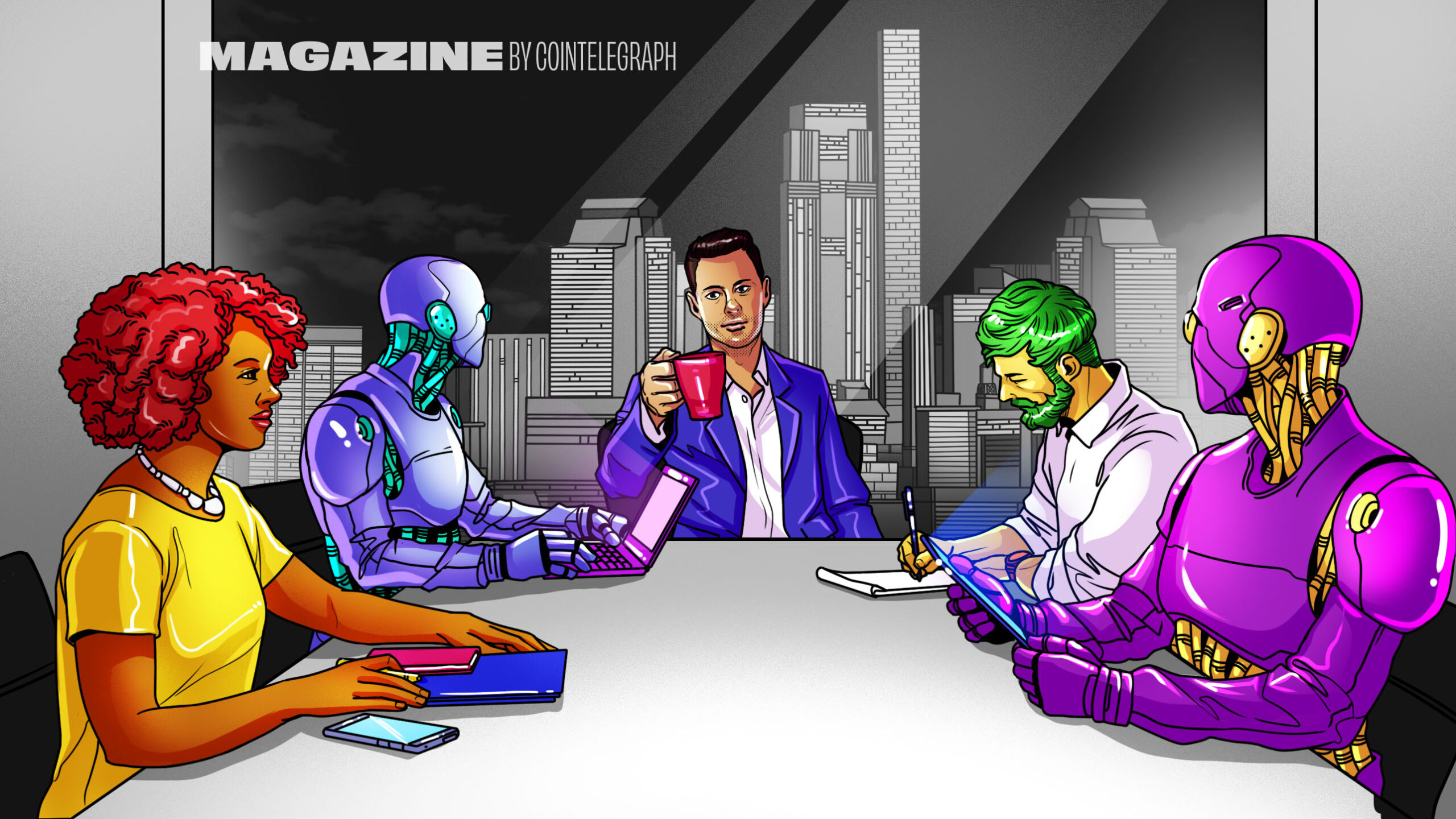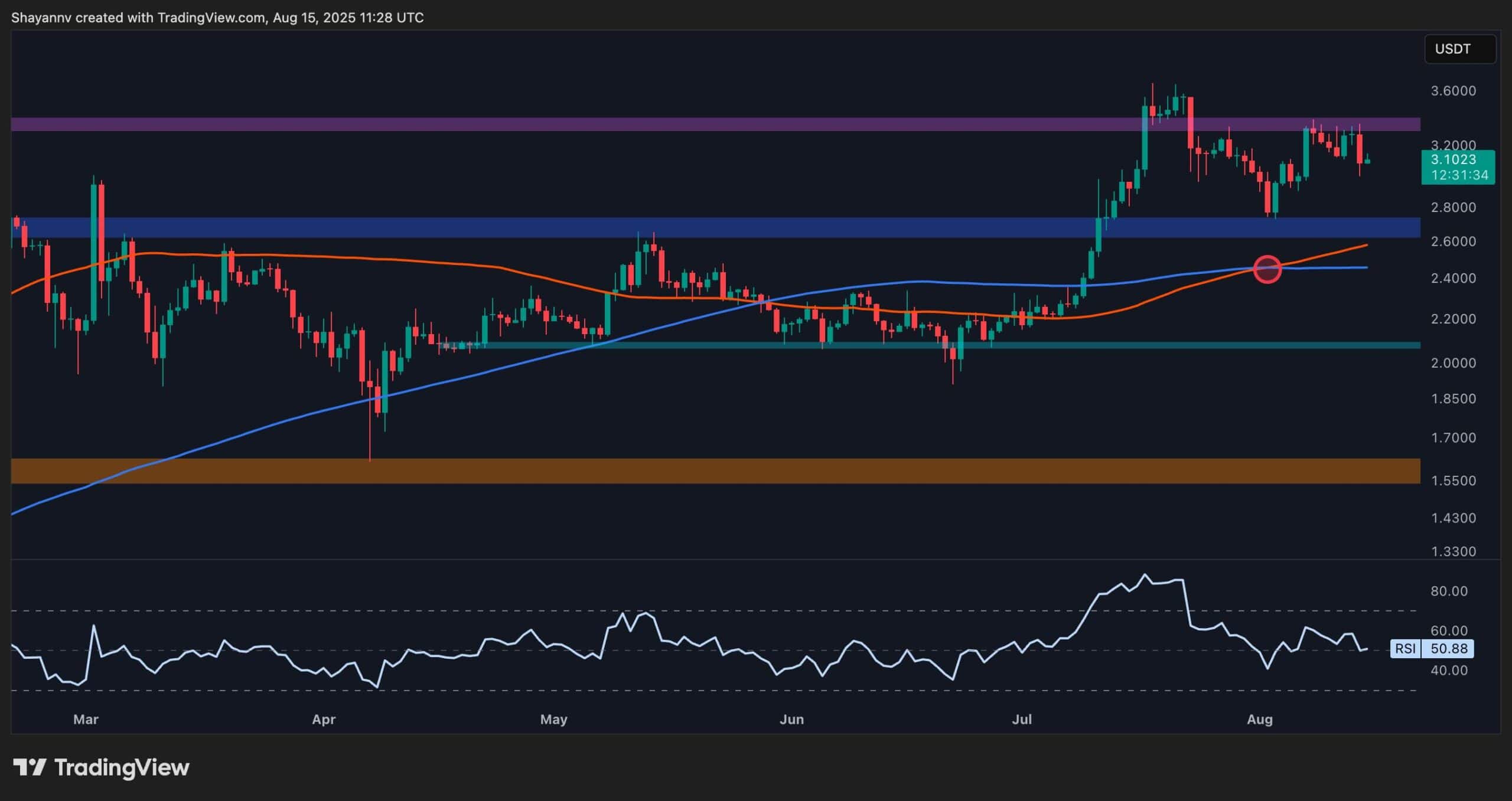Cryptocurrency
‘AI has killed the industry’: EasyTranslate boss on adapting to change

The launch of generative AI products over the past nine months has the world talking about how it will change the future. Many are frightened. Others are excited about the opportunity.
A report last month from Next Move Strategy Consulting predicts the AI industry will grow 20x in the next seven years, creating a $2 trillion business, up from its current value of $100 billion. It might sound like wild hype, but other analysts from McKinsey, Morgan Stanley and BlackRock all map out a similar trajectory. AI is here to stay, and a lot of human lives will be upended. But it’s also the chance of a lifetime.
Frederik Pedersen, the co-founder of Danish AI company EasyTranslate and son of one of Denmark’s most famous men, is approaching the future head-on.
“I have been saying for a long time that translation is dead and AI has killed the industry as we know it, but that hasn’t gone down particularly well with my competitors. Now, however, those same people are listening and are realising that they may be too late if they want to transform their business.”
Son of Danish politician Klaus Riskær Pedersen
It’s not easy to be the child of a powerful person, as has been recently and brilliantly illustrated by the TV series Succession. If there’s a Logan Roy in the family, it’s difficult for the child to be their own person.
Some crash and burn; some, such as singers Justin Bieber and Miley Cyrus, try to shock their parents by being outlandish and independent. It’s rarely a good look.
Others, however, do it in smarter ways and emerge from that parental shadow by adopting different mechanisms to build their own reputation.
In the case of Pederson, now 35, it was technology that enabled him to do so. First, with translation software, and now, generative AI has overtaken it.

His dad, Klaus Riskær Pedersen, is a controversial Danish political party leader, entrepreneur, businessman and author. Everybody in Denmark knows his name.
His chequered career includes being a member of the European Parliament for the Liberal Party, writing books, developing, building and selling around 15 companies over three decades. He set up his own political party in 2018.
But there have been controversies. He has several convictions for fraud and has spent different spells in jail, as well as splitting Danish public opinion and having the social life that goes with such apparent conviviality.
At first, (Frederik) Pedersen suffered. In and out of schools, he tried to find a way of acceptance and struggled. He didn’t make it to university, but he did know about technology and became interested in its power and consequently found a way to plow his own furrow.
“It took me some time to find a direction, but slowly I realized that the world was all about communication. I knew I was from a privileged family, but educators always seemed to have a lack of empathy and communication when I was a child. I was made to feel different, and it was a difficult place to be.
“But I came through it, and those life lessons set me up for all the changes that life throws at you. So I set up a translation company, and now I’m pivoting the company into generative AI because of the huge opportunity it offers humanity, not least the same elements of communication,” says Pedersen.
Early access to OpenAI’s ChatGPT
The AI light started to dawn on him back in 2020.
That year, Pedersen applied to the Danish Innovation Fund for a 65,000 euro grant to create a content generator engine that would enable him to create a new form of translation:
“I realized that the biggest issue in e-commerce when it came to languages was not translation in itself, but creating localized content for retailers’ different products that customers could relate to,” he explains, adding the company spent the money to train “neural networks to create these product descriptions.”
Also read: AI Eye — Real uses for AI in crypto, Google’s GPT-4 rival, AI edge for bad employees
A neural network is a type of machine learning process called deep learning that uses interconnected nodes or neurons in a layered structure that resembles the human brain.
“We branded it content-as-a-service and couldn’t believe we were one of the first companies to do it,” he says, though it ended up proving the old adage that being early is the same as being wrong.
“Ultimately we were ahead of the technology and while our technology could build sentences, it just wasn’t good enough for our customers.”
This first effort was not wasted time and money, however, as it meant the company was able to hit the ground running when large language models were released publicly. EasyTranslate obtained early access to ChatGPT because it already had an account with OpenAI and was able to adopt and execute the technology instantly.
From that point, EasyTranslate pivoted to a generative AI content future based on Pedersen’s thesis that traditional translation was indeed “dead.”
Translation meets technology
It was not the first change in direction for Pedersen’s company. Formed in 2010 without venture capital, the translation service grew quickly.
In 2016, it went after bigger fish and started offering interpretation services to the Danish government after realizing there was an opportunity with the launch of Apple’s FaceTime. According to Pedersen, interpreters were super-expensive, inefficient and slow, and travel for in-person events wasn’t exactly “climate change-friendly.”
Pedersen created a video interpretation app that streamlined costs and increased efficiency by offering a marketplace and matching service for interpreters as well as remote interpreter services.
Danish municipalities signed up for the service, including the Danish Ministry of Justice, recognizing that bringing an interpreter to a court was a very expensive business, especially due to the often last-minute nature of such needs.
Read also
Danish operation a success, but the patient died
At its height, the company was running 1,000 interpretation meetings a day, and between 2017 and 2019, it was responsible for more than 70% of the Danish government’s interpretation business.
However, Pedersen says the Danish government had never outsourced such business, and the relationship turned sour.

“It was a very mutual and fruitful relationship for a long time, but we realized that working with governments was more difficult than we imagined. It was like the cliche of a heavy tanker not being able to turn around.
“Again, it was the first learning curve for me. Yes, our data processing wasn’t as good as it could have been and working with antiquated systems and reasoning was very difficult.
“Eventually, the Danish government decided they didn’t want to carry on with our relationship. It was hard at the time, but I still believe we succeeded, and we learned a lot,” he says.
“Let’s just say, the operation was a success, but the patient died. There was also a lot of opposition from the strong Danish trade unions who thought we were putting people out of jobs.”
“But it was not about putting people out of jobs, it was working with technology in the same way we work with AI now. Our interpreters who decided to join our community were extremely happy with our software. They said it was like having a PA that coordinated their calendar and ensured them productive days with the highest possible earnings — they managed to increase those earnings.”
Impact of AI on jobs
The impact of AI technology on employment is a source of great anxiety for many, with some predicting entire industries will be wiped out, while others suggest jobs will change and evolve rather than disappear.
A recent study by the International Labour Organization found that women will be disproportionately affected by automation, with around 7.8% of jobs held by women in high-income countries (or 21 million) likely to be automated, but only 2.9% of jobs held by men (9 million).
Translation is a highly gendered industry too, with women accounting for around 67% of translators.
Pedersen’s thinking about the essential human element in technology — be that content generation or generative AI — is now central to EasyTranslate’s business.
Also read: AI Eye — Get better results being nice to ChatGPT, AI fake child porn debate, Amazon’s AI reviews
He believes that the combination of humans and AI is more powerful than just letting the AI do everything, using the example of a hard-working high school student who was angry at classmates for using AI to cheat.
Instead of cheating herself, she asked ChapGPT to mark her already-written essay. It sorted out the grammar and typos, and it gave her extra resources and links to improve her work beyond that of the cheater.
“In business, everybody is looking for the magic of balance in the marketplace, that sweet spot where pricing, innovation and technology are aligned. We are also doing that when it comes to AI and humans; we want that magic balance there as well,” he says.
Humans still required in the loop
He cites “humans in the loop” as the way forward for humans and machines. Generative AI can do the heavy lifting, and humans can finish and finesse the job. It creates content in any language generated by AI but enhanced by humans.
“There are others in business, such as Reuters, who also profess the ‘humans in the loop’ phrase. Again, I’ve been saying for a long time that this is the way forward to make both technology and humans better.
“By harnessing the power of both and increasing machine learning in the process, I believe that the current dominance of LLMs will be replaced by small language models that can be tailored exactly for the customer — open source generative AI — that will be the future.”
“That’s what we’re planning for and how the whole AI sector will play out. Those companies that are prepared for that will prosper; those who aren’t will fail,” he says.
Since Pedersen’s pivot to AI at the end of 2022, there has been increased investor interest in EasyTranslate, and the company raised 2.75 million euros earlier this year
“We think that we’ve been ahead of our time, and that thinking has led us to embrace AI and take us to the next level. AI itself is just the mirror of what humanity has already created; AI is really the technological history of human knowledge.
“I think it’s obvious that the two are perfectly compatible, that magic balance, so as generative AI evolves, so will those humans in the loop. Nobody with a good and adaptive brain will lose their job; their jobs and roles will be better and more creative,” he concludes.
His father should be proud.
Subscribe
The most engaging reads in blockchain. Delivered once a
week.

Cryptocurrency
Ethereum Foundation, Whales, and Hackers: What’s Driving the ETH Sell-Off?

TL;DR
- Whales, hackers, and the Ethereum Foundation wallets moved over $500M in ETH through large sales and withdrawals.
- Ethereum transfers rose to 4.6M ETH, nearing the monthly high of 5.2M recorded in July.
- Staking inflows hit 247,900 ETH, the highest in a month, locking more supply from trading.
Large Withdrawals and Whale Activity
Ethereum (ETH) has seen heavy movement from major wallets over the past few days. On-chain data from Lookonchain shows a newly created wallet pulled 17,591 ETH, worth $81.62 million, from Kraken in just two hours.
Over three days, two new wallets withdrew a combined 71,025 ETH, valued at $330 million, from the exchange.
One of these wallets, address 0x2A92, has withdrawn 53,434 ETH, worth $242.34 million, in two days. This includes a recent purchase of 30,069 ETH, valued at $138.46 million, during a market drop.
Major ETH Holders Offload Millions Amid Price Rally
In contrast, several separate entities have been disposing of some ETH holdings. A wallet tied to a hacker address 0x17E0 sold 4,958 ETH for $22.13 million at $4,463, securing a profit of $9.75 million. Earlier this year, the same address sold 12,282 ETH at $1,932 and later bought back part of the amount at higher prices.
A different whale sold 20,600 ETH for $96.55 million over the past two days, generating a profit of more than $26 million after holding the position for nine months.
Meanwhile, an Ethereum Foundation-linked wallet, 0xF39d, sold 6,194 ETH worth $28.36 million in the last three days at an average price of $4,578.
Recent sales from the same wallet included an additional 1,100 ETH and 1,695 ETH for over $12.7 million combined.
The #EthereumFoundation-linked wallet(0xF39d) sold another 1,300 $ETH($5.87M) at $4,518 ~11 hours ago.
Over the past 3 days, this wallet has sold a total of 6,194 $ETH($28.36M) at an average price of $4,578.https://t.co/4hfCWymHVG pic.twitter.com/ErUyEY8SJy
— Lookonchain (@lookonchain) August 15, 2025
Network Activity on the Rise
CryptoQuant data shows Ethereum’s total tokens transferred have been climbing since August 9. After ranging between 1 million and 3 million ETH through late July and early August, transfers have risen to 4.6 million ETH, approaching the monthly high of 5.2 million recorded in mid-July. This increase has occurred alongside a price rally from about $3,400 to $4,600.
Interestingly, staking inflows generally stayed between 20,000 and 80,000 ETH per day over the past month. On August 14, inflows jumped to 247,900 ETH, the highest in the period.
At the time, ETH was trading near $4,600. Large staking deposits reduce the amount of ETH available for immediate trading, as staked coins are locked for a set period.
In the meantime, ETH trades at $4,647 with a 24-hour volume of $68.25 billion, down 2% on the day but up 19% over the week.
Binance Free $600 (CryptoPotato Exclusive): Use this link to register a new account and receive $600 exclusive welcome offer on Binance (full details).
LIMITED OFFER for CryptoPotato readers at Bybit: Use this link to register and open a $500 FREE position on any coin!
Cryptocurrency
Massive DOGE Whale Activity Hints at $1 Breakout

TL;DR
- Whales bought two billion DOGE this week, lifting their combined holdings to 27.6 billion coins.
- A single 900M DOGE transfer worth $208M to Binance drew attention to large exchange movements.
- DOGE broke key resistance, with momentum building for a possible push toward the $1 price mark.
Price and Market Moves
Dogecoin (DOGE) traded at $0.23 at press time, slipping 4% over the past day but still showing a 2% gain for the week. Daily turnover came in at about $6.18 billion.
Meanwhile, the broader crypto market saw over $1 billion in liquidations. Hotter-than-expected US Producer Price Index data pushed traders to scale back expectations of a near-term Federal Reserve rate cut. DOGE had roughly 290,500 coins liquidated during the sell-off.
On the two-week chart, analyst Trader Tardigrade notes that DOGE has cleared a downward-sloping resistance line after completing what appears to be a “wave V” in an Elliott Wave sequence. Similar setups in the past, where prolonged declines stayed within falling channels before breaking higher, have been followed by sharp rallies.
$Doge/2-week#Dogecoin is gaining strong momentum to surge above $1 pic.twitter.com/TuSEKr19nv
— Trader Tardigrade (@TATrader_Alan) August 15, 2025
Momentum gauges are also turning up. The Stochastic RSI, which had dropped into oversold territory, is now heading higher. Previous reversals from this zone have coincided with sustained upward moves. The current formation points to a possible run that could carry DOGE past the $1 mark.
Heavy Whale Buying and Large Transfers
As reported by CryptoPotato, blockchain data shows large investors have added two billion DOGE in the past week, spending just under $500 million. That brings their holdings to about 27.6 billion coins, or 18% of the supply. The buying streak has prompted speculation within the community.
Recently, Whale Alert flagged a 900 million DOGE transfer worth about $208 million into Binance. The tracking indicates that it originated from a wallet connected to the exchange, likely as an internal activity. The address involved holds 2.88 billion DOGE, one of the largest balances on the network.
Ali Martinez also reports that transactions above $1 million reached a one-month high, with activity building since early August and peaking as DOGE traded at $0.25.
Whales are back! Dogecoin $DOGE activity at a 1-month high. pic.twitter.com/C83Pv68mCt
— Ali (@ali_charts) August 14, 2025
Sentiment Building
Analyst Gordon described the current setup as “a nice bit of consolidation” before a potential breakout, adding,
“This will be one of the first coins normies FLOCK to & the pump will be MASSIVE.”
With whale accumulation rising, high-value transfers increasing, and a bullish technical pattern in play, DOGE is positioned for a potential push toward $1 if momentum holds.
Binance Free $600 (CryptoPotato Exclusive): Use this link to register a new account and receive $600 exclusive welcome offer on Binance (full details).
LIMITED OFFER for CryptoPotato readers at Bybit: Use this link to register and open a $500 FREE position on any coin!
Cryptocurrency
Ripple Price Analysis: XRP at Risk as Key Support Levels Could Trigger Sharp Drop

XRP has recently entered a consolidation phase after a strong rally earlier this summer, with the price action now hovering around key resistance levels on both its USDT and BTC pairs. Yet, while momentum has slowed, the charts still indicate a generally bullish structure, with multiple key support levels remaining firmly in place.
Technical Analysis
By ShayanMarkets
The USDT Pair
On the XRP/USDT daily chart, the price is currently trading near the $3.10 mark, facing a strong resistance zone around $3.40. This follows a breakout above the $2.70 range in July, which has now flipped into a support area.
Both the 100-day and 200-day moving averages are also trending upward and recently formed a bullish crossover around $2.45, reinforcing the medium-term bullish sentiment. If the $3.40 resistance breaks, a push toward the critical $4.00 range becomes likely.
However, the RSI hovering near the neutral 50 level suggests a lack of strong momentum for now, meaning a short-term pullback into the $2.80 support zone is still possible.
This zone will be key for maintaining the bullish structure. Losing it could open the door for a deeper correction toward the 200-day moving average located around the $2.40 mark. Yet, as long as the price stays above the moving averages, the broader trend remains bullish.
The BTC Pair
Looking at the XRP/BTC chart, the pair has recently pulled back after hitting the 3,000 SAT resistance, with the price currently around 2,600 SAT.
This follows a clean breakout above the long-term descending channel and a successful retest of its upper boundary, which coincided with the 200-day moving average and the 2,400 SAT support zone. This confluence remains a key bullish technical factor, as holding above it could attract renewed buying pressure.
That said, RSI levels around 48 show that momentum has cooled after the sharp July rally, meaning XRP may continue ranging between 2,400 SAT and 3,000 SAT in the near term. A decisive close above 3,000 SAT would likely open the path to the 3,400 SAT zone, while losing 2,400 SAT could shift the bias back toward 2,000 SAT support. For now, the structure still favors the bulls as long as higher lows remain intact.
Binance Free $600 (CryptoPotato Exclusive): Use this link to register a new account and receive $600 exclusive welcome offer on Binance (full details).
LIMITED OFFER for CryptoPotato readers at Bybit: Use this link to register and open a $500 FREE position on any coin!
Disclaimer: Information found on CryptoPotato is those of writers quoted. It does not represent the opinions of CryptoPotato on whether to buy, sell, or hold any investments. You are advised to conduct your own research before making any investment decisions. Use provided information at your own risk. See Disclaimer for more information.
Cryptocurrency charts by TradingView.

 Forex4 years ago
Forex4 years agoForex Today: the dollar is gaining strength amid gloomy sentiment at the start of the Fed’s week

 Forex3 years ago
Forex3 years agoUnbiased review of Pocket Option broker

 Forex3 years ago
Forex3 years agoDollar to pound sterling exchange rate today: Pound plummeted to its lowest since 1985

 Forex4 years ago
Forex4 years agoHow is the Australian dollar doing today?

 Cryptocurrency4 years ago
Cryptocurrency4 years agoWhat happened in the crypto market – current events today

 World3 years ago
World3 years agoWhy are modern video games an art form?

 Commodities4 years ago
Commodities4 years agoCopper continues to fall in price on expectations of lower demand in China

 Economy3 years ago
Economy3 years agoCrude oil tankers double in price due to EU anti-Russian sanctions




























